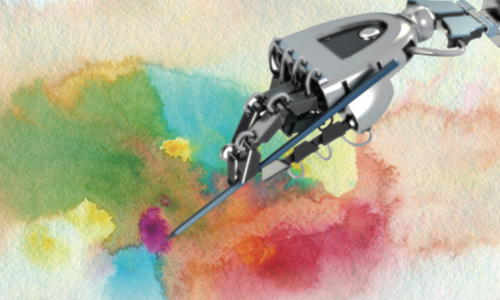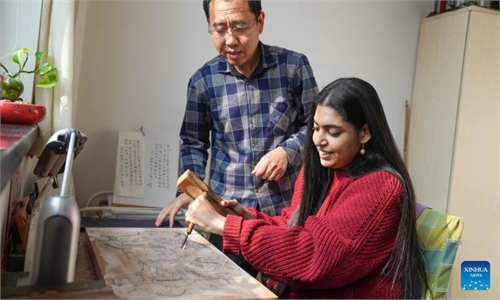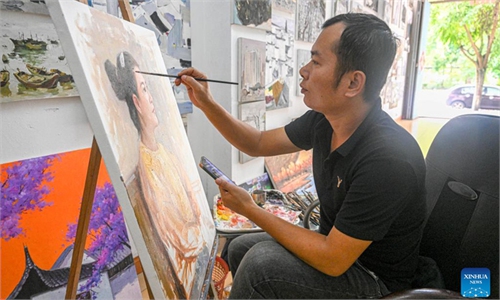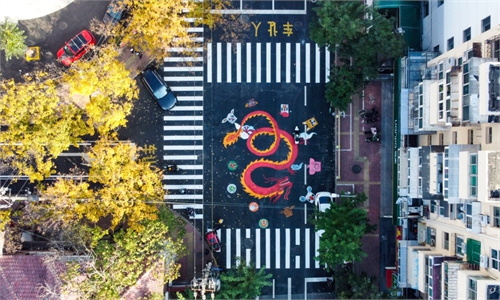ARTS / ART
AI art generators become new favorite on Chinese internet, but bring controversy
Art in the new age

Photo: VCG
Just by typing a few keywords and waiting a few seconds, a picture comparable to that painted by a human artist appears on screen. At first glance, a viewer would probably not realize that it was painted by Artificial Intelligence (AI).AI art generators have seemingly swept the Chinese internet overnight. In these digital paintings created by AI, an elderly man can become a handsome animated image and even pets such as kittens and puppies can be turned into adorable cartoon girls or boys. Even ordinary people without any painting skills can be the possessors of an exquisite artwork with just a few taps of the keyboard.
Chinese netizens have been stunned and amused by the results created by AI painting programs. Some platforms providing AI painting services gained more than 600,000 users in a single day in November, with people aged 25 and under accounting for more than 60 percent of new users.
New things are always accompanied by controversy. Issues such as whether AI painting programs will replace human artists and the copyrights to these paintings are being hotly debated on Chinese social media platforms.
All the artists and experts who talked with the Global Times were confident that human imagination and aesthetics cannot be replaced by AI, for now at least.
Embracing the future
Jia Yunfan, a 26-year-old digital artist, has been embracing the new AI movement.
"I was trained as an oil painter ever since I was young. But canvas, and the realistic style is just too classic and made me only be defined as a painter. When I do AI artwork, I get to work with automatic car experts and car maker brands, this has freed art to not just be in its field," Jia noted.
He also noted that due to its digital nature, newly emerged art forms such as AI painting can help artists reach global audiences and broaden their artistic realms.
After overseas AI programs that create images from textual prompts, such as Midjourney, were introduced to China, some Chinese tech giants or AI technology companies soon developed digital tools to meet local users' needs and put them on platforms such as WeChat.
After logging in the AI creation program, users can choose to upload photos that they want to turn into art or type Chinese keywords and even ancient Chinese poems to adjust the style a painting will be in.
Huang Ge, a fashion illustrator from Shanghai, told the Global Times on Wednesday that it usually takes several hours to 3-5 days to complete one traditional illustration. Illustrators need time to create and they are expensive to hire, but with AI tools, the efficiency is greatly improved as hundreds of pictures can be generated every day.
"AI painting has a variety of modification modes, and the picture can be modified directly in the painting software without re-uploading and also has more free space for displaying works," Huang said.
Ding Jiao, a comic artist well-known for her comics about the Beijing 2022 Paralympic Winter Games, said that she considers the popularity of AI art generators reasonable as many people who are not good at drawing can create great works through them and they can satisfy users' curiosity.
High-tech Chinese cities such as Shenzhen, Guangdong Province, can provide young artists more opportunities to compete on the world stage, Liu Jiayu, an AI art adept who once brought her artworks to the Venice Biennial, told the Global Times.
"China, especially its thriving digital industry hubs like Shenzhen, can offer us the most up-to-date media art facilities. Also, China has good exhibiting resources for artists that can give them more opportunities to display their works," Liu noted.
Unanswered questions
The trend has again caused some panic about whether AI is gradually replacing human beings. In the hot topic "using a picture to prove that human artists will never be replaced by AI" on Sina Weibo, many netizens uploaded imaginative paintings to try and prove that humans are better than AI.
"Although AI technology has developed rapidly and it is difficult to distinguish some AI-created paintings from human works, AI cannot replace humans as it is in the infant stage and can mimic human behavior. The warmth and inspiration in human's creations are irreplaceable," Ding Daoshi, a veteran independent analyst in the internet sector, told the Global Times.
Huang also pointed out that AI painting software cannot replace illustrators.
"The question is similar to 'whether robots will replace humans.' The answer is no! It indeed will bring a crisis for some new illustrators without too much experience in the commercial art industry. However, AI painting may represent a reform in productivity in the field and can only be used as an auxiliary role to help us illustrators," Huang said.
Jia said that when he went to study in the UK's Royal Academy of Arts, he learned that art's values lie not only in representation but also the artist's mind and emotional contributions. Yet this is lacking in AI art.
Another controversial issue is that there is no consensus of who owns the copyright of AI art. Some users have openly sold some AI paintings and have earned money, but it is still a gray area about whether these artworks belonging to users, the digital tool developers or even the AI itself.
Ding noted that the various sides should get together to debate the issue and come up with some accepted rules as soon as possible because AI is already penetrating deeply into every facet of the lives of human beings.



